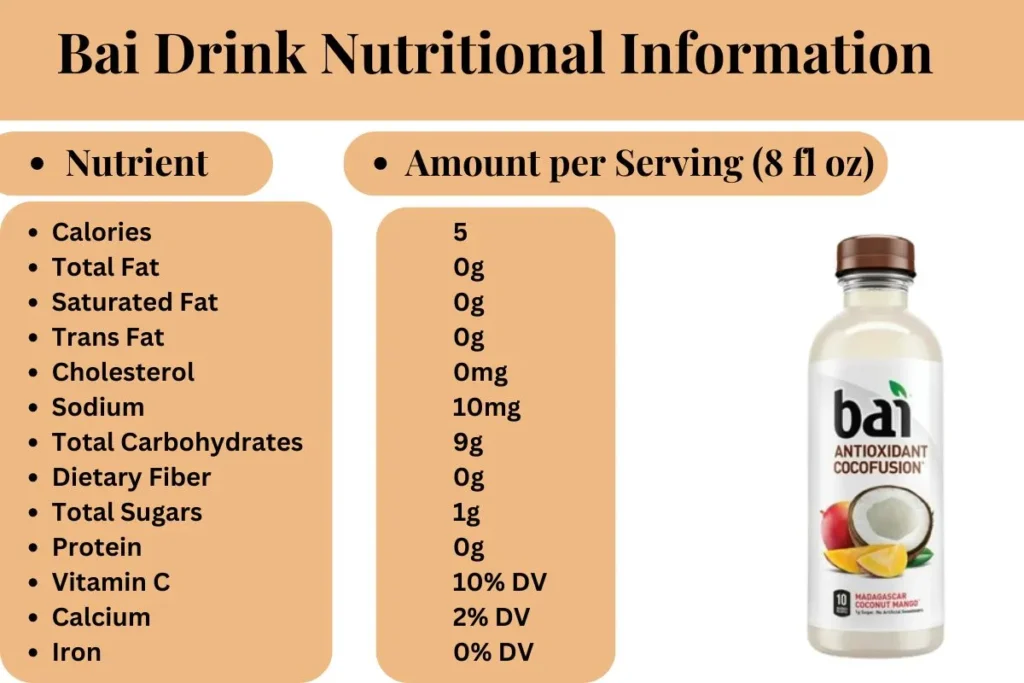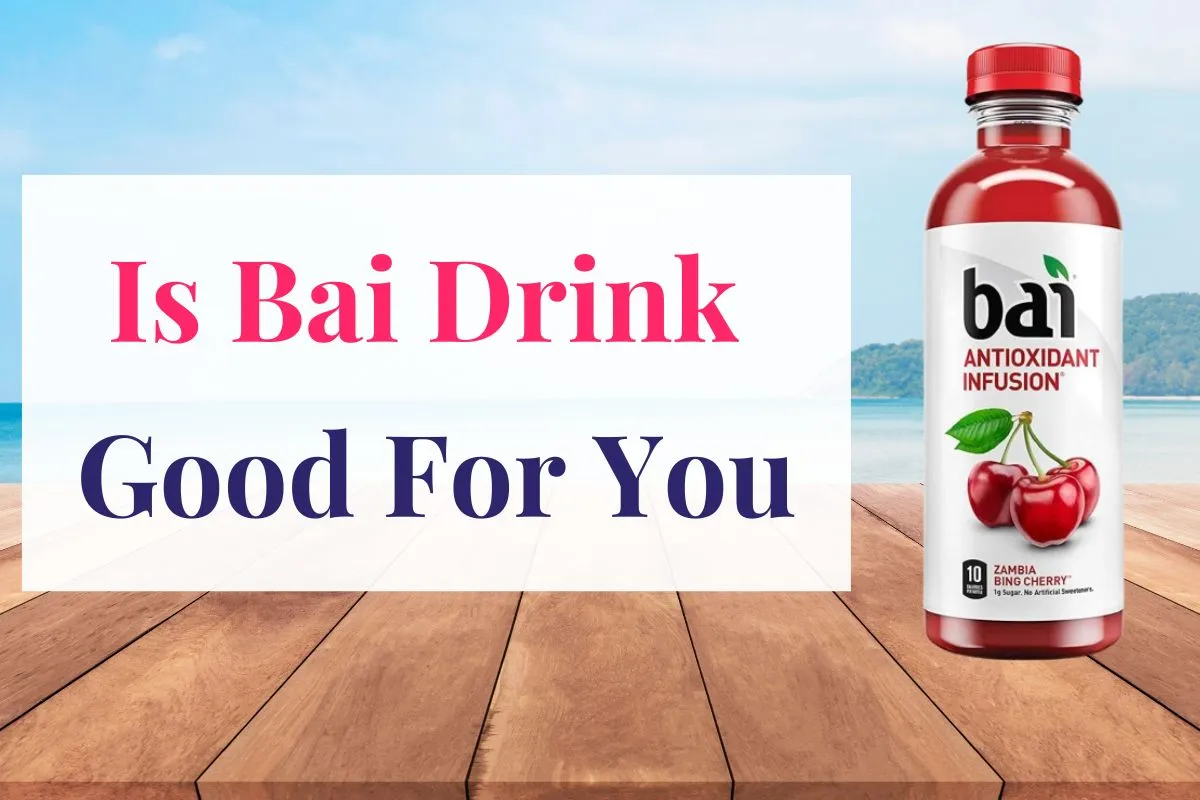Bai drinks have gained popularity as a refreshing and seemingly healthy beverage option. Marketed as an antioxidant-infused beverage, Bai drinks come in a variety of flavors and are often perceived as a better alternative to traditional sugary drinks. But are they really good for you?
One of the key considerations when evaluating the healthiness of any beverage is its calorie and sugar content. Bai drinks are a desirable choice for people limiting their calorie consumption because they usually have extremely few calories per serving.
Let’s delve deeper into that Is Bai Drink Good For You and it’s nutritional content, benefits, potential drawbacks, and suitability of Bai drinks for different individuals.
The Background of Bai Drink
Bai Brands LLC, commonly known as Bai, was founded in 2009 by entrepreneur Ben Weiss. The company’s journey started with the idea to develop a delicious, nutritious beverage that was also healthier.
Ben Weiss was inspired to create Bai after learning about the health benefits of the coffee fruit, the outer cherry-like fruit that surrounds the coffee bean. Traditionally, coffee fruit had been discarded during the coffee bean harvesting process, but Weiss saw potential in utilizing this byproduct to create a unique beverage.
In 2009, Bai launched its first product, Bai5, a line of antioxidant-infused beverages made from coffee fruit extract. The name “Bai” is derived from the Mandarin word for “pure.” A range of fruit flavors comprised the original Bai5 portfolio; each serving only had five calories and no artificial sweeteners.
As consumers became increasingly interested in healthier beverage options, Bai quickly gained popularity for its refreshing taste and nutritional profile. The brand’s commitment to using natural ingredients and innovative flavors resonated with health-conscious consumers seeking alternatives to traditional sugary drinks.
In 2015, Dr Pepper Snapple Group (now Keurig Dr Pepper) recognized the potential of Bai and acquired the company for $1.7 billion. The acquisition provided Bai with additional resources and distribution channels to expand its reach and introduce new product lines.
Since joining forces with Keurig Dr Pepper, Bai has continued to innovate and introduce new flavors and product lines to meet the evolving preferences of consumers. The brand has expanded its offerings to include Bai Antioxidant Water, Bai Bubbles (carbonated beverages), and Bai Supertea (tea-infused beverages), among others.
Today, Bai remains committed to its mission of providing delicious and nutritious beverages made from high-quality ingredients. The brand’s dedication to innovation, sustainability, and wellness has solidified its position as a leader in the functional beverage industry, inspiring consumers to “drink life in” and embrace a healthier lifestyle.
List of Ingredients in Bai Drinks
Bai Antioxidant Infusion drinks contain the following ingredients:
- Water: The primary ingredient in most Bai beverages, providing hydration.
- Erythritol: An organic sweetener that comes from plants and fruits that is frequently used to increase sweetness without adding calories. Erythritol is a popular option for people who want a sweet flavor without the negative effects of sugar because it is low in calories and does not dramatically alter blood sugar levels.
- Coffee Fruit Extract: An extract with flavor and antioxidant qualities that comes from the outer fruit of the coffee plant. Coffeefruit extract contains beneficial compounds such as polyphenols and chlorogenic acids, which contribute to its antioxidant effects and may offer health benefits.
- Citric Acid: A naturally occurring acid that serves as a preservative and flavor enhancer in citrus fruits. By preventing the formation of germs and mold, citric acid balances out the sweetness of other ingredients in the drink and adds acidity. This helps prolong the shelf life of the product.
- Natural Flavors: Plant-based extracts and essences used to enhance the taste of Bai drinks. Natural flavors provide the distinctive taste and aroma of each Bai drink flavor, sourced from fruits, herbs, and spices to create a delicious and satisfying beverage experience.
- Stevia Leaf Extract: Stevia leaf extract contains compounds called steviol glycosides, which provide intense sweetness with zero calories and minimal impact on blood sugar levels.
- Malic Acid: An acid that is present naturally in fruits and is used to improve their tartness and flavor. Malic acid contributes to the refreshing and tangy taste of Bai drinks, adding complexity to the flavor profile and stimulating the taste buds.
- Potassium Citrate: Potassium citrate helps regulate acidity in the drink, ensuring a balanced pH level, and may also contribute to the overall flavor profile by enhancing certain taste sensations.
- Fruit Juices: Concentrated juices from various fruits, used for flavor and nutritional content. Fruit juices provide natural sweetness, vitamins, and minerals to Bai drinks, enhancing their taste and nutritional profile with the goodness of real fruit.
- White Tea Extract: White tea extract adds a delicate and mellow taste to Bai drinks, along with additional antioxidant benefits to support overall health and wellness.
- Ascorbic Acid (Vitamin C): Ascorbic acid acts as a natural preservative, protecting the integrity of the drink and providing antioxidant benefits to support immune health and reduce oxidative stress.
- Vegetable Juice (for Color): Natural juices from vegetables such as carrots or purple sweet potatoes, used to add color to Bai drinks. Vegetable juices provide vibrant hues to the beverages, enhancing their visual appeal without the need for artificial dyes or colors.
- Caffeine (in select flavors): Derived from coffee beans or tea leaves, added to certain Bai drinks for a mild energy boost. Caffeine provides a natural source of energy, helping to increase alertness and mental focus, making it an ideal addition to Bai drinks for those seeking a pick-me-up.
Bai Drink Nutritional Information

Is Bai Drink Good For You Yes, Bai Antioxidant Infusion drinks boast a noteworthy nutritional profile that sets them apart from many other beverages on the market. Each serving contains a mere 10 calories, making it an attractive option for those watching their calorie intake.
Moreover, the drinks have only 1 gram of sugar per serving, a significantly lower amount compared to most sugary drinks like soda or fruit juices.
The carbohydrate content of Bai drinks is 9 grams per serving, but it’s essential to note that 8 of those grams come from erythritol, a sugar alcohol that is not metabolized by the body, meaning it does not contribute to the calorie count or impact blood sugar levels.
Another aspect of Bai’s nutritional profile is its caffeine content. An 18-ounce bottle of Bai contains 78 milligrams of caffeine, which is comparable to other caffeinated beverages like tea or some energy drinks.
This moderate amount of caffeine can provide a gentle energy boost without the jitters or crashes often associated with high-caffeine drinks. However, it’s crucial for individuals sensitive to caffeine or those limiting their intake to be mindful of this content.
In addition to its low calorie, low sugar, and moderate caffeine content, Bai drinks are also fortified with vitamins and minerals. The specific vitamins and minerals added may vary depending on the flavor, but they typically include nutrients like vitamin C, vitamin E, and potassium.
While these added nutrients can contribute to overall health, it’s important to remember that they are not a substitute for a balanced diet rich in whole foods. Bai drinks can be a part of a healthy lifestyle when consumed in moderation, but they should not be relied upon as a primary source of essential nutrients.
| Nutrient | Amount per Serving (8 fl oz) |
| Calories | 5 |
| Total Fat | 0g |
| Saturated Fat | 0g |
| Trans Fat | 0g |
| Cholesterol | 0mg |
| Sodium | 10mg |
| Total Carbohydrates | 9g |
| Dietary Fiber | 0g |
| Total Sugars | 1g |
| Protein | 0g |
| Vitamin C | 10% DV |
| Calcium | 2% DV |
| Iron | 0% DV |
Benefits of Bai Drink
Bai Antioxidant Infusion drinks offer several potential benefits that make them an appealing choice for health-conscious consumers.
Antioxidant Content
One of the most significant advantages of Bai drinks is their antioxidant content. These beverages are infused with antioxidants derived from coffeefruit extract and white tea extract, which are known for their potential to combat oxidative stress in the body.
Oxidative stress has been linked to various health issues, including inflammation, premature aging, and certain chronic diseases. By providing a source of antioxidants, Bai drinks may help support overall health and well-being.
Low Calorie and Sugar Content
Another benefit of Bai drinks is their low calorie and sugar content. With only 10 calories and 1 gram of sugar per serving, these beverages can be a smart alternative to sugary drinks like soda, which are often high in empty calories and can contribute to weight gain and other health problems.
The low sugar content of Bai drinks also makes them a suitable option for people with diabetes or those following a low-sugar diet. Additionally, the use of erythritol as a sweetener in Bai drinks provides sweetness without the negative effects of added sugars.
Utilization of Natural Sweeteners
Bai beverages are sweetened with a blend of erythritol and stevia, both of which are naturally derived sweeteners. Erythritol is a sugar alcohol that offers the sweetness of sugar but with minimal calories and no impact on blood sugar levels, making it safe for diabetics and those watching their carbohydrate intake.
Stevia, on the other hand, is derived from the leaves of the Stevia plant and is much sweeter than sugar but without the caloric content. This combination allows Bai to deliver a sweet taste without the added calories or the metabolic disruptions associated with refined sugar.
Caffeine Content
The moderate caffeine content in Bai drinks can also be considered a benefit for some individuals. The 78 milligrams of caffeine in an 18-ounce bottle can provide a gentle energy boost, helping to improve alertness, concentration, and mental performance.
This can be particularly beneficial for people who need a pick-me-up during the day but want to avoid the high caffeine content of some energy drinks or coffee. However, it’s essential to consume caffeine in moderation and be aware of individual tolerance levels.
Ready-to-Drink Beverage
Bai drinks also offer the convenience of a ready-to-drink beverage that can be enjoyed on the go. Unlike preparing tea or other antioxidant-rich drinks from scratch, Bai provides a quick and easy way to consume antioxidants and other beneficial nutrients.
This convenience factor can be especially valuable for busy individuals who may not have the time or resources to prepare healthy drinks from scratch regularly.
Variety of Flavors
The variety of flavors available in the Bai Antioxidant Infusion line can make staying hydrated and consuming antioxidants more enjoyable.
With options like Brasilia Blueberry, Costa Rica Clementine, and Malawi Mango, among others, consumers can choose flavors that appeal to their taste preferences, making it more likely that they will consistently reach for a Bai drink instead of a less healthy alternative.
The appealing taste of Bai drinks can help individuals stay on track with their health goals without feeling like they are sacrificing flavor or enjoyment.
Use of Natural Ingredients
Another benefit of Bai drinks is their use of natural ingredients and lack of artificial colors or preservatives. They are sweetened with a combination of erythritol and stevia leaf extract, which are natural alternatives to artificial sweeteners.
This can be appealing to consumers who prefer to avoid artificial ingredients in their diet and prioritize natural options.
Source of Vitamin C
Many Bai products contain added Vitamin C, providing around 20% of the recommended daily value per serving. Vitamin C is vital for the growth, development, and repair of all body tissues.
It’s involved in several body functions, including collagen formation, iron absorption, the immune system, wound healing, and maintaining the health of bones, cartilage, and teeth. Regular consumption of Vitamin C-rich beverages can help support these essential functions.
Promotes Hydration
While Bai drinks should not replace water as the primary source of hydration, they can be a more flavorful alternative that encourages adequate fluid intake.
Staying hydrated is essential for maintaining the health of every system in the body, including the heart, brain, and muscles. It also helps in temperature regulation, keeping joints lubricated, and preventing infections.
Potential Drawbacks of Bai Drink
While Bai Antioxidant Infusion drinks have several potential benefits, it’s essential to consider some of the potential drawbacks as well.
Erythritol sensitivity:
Some people may experience digestive issues, such as bloating, gas, or diarrhea, when consuming large amounts of erythritol, the sugar alcohol used as a sweetener in Bai drinks. While erythritol is generally well-tolerated, individuals with sensitive stomachs or those consuming excessive amounts may encounter these side effects.
Caffeine content:
Although the moderate caffeine content in Bai drinks can be beneficial for some, it can also be a drawback for others. People sensitive to caffeine, pregnant women, or those with certain medical conditions may need to limit or avoid caffeine intake. Consuming Bai drinks late in the day may also disrupt sleep patterns for some individuals.
Limited nutritional value:
While Bai drinks contain antioxidants and some added vitamins and minerals, they should not be relied upon as a significant source of nutrients. The nutrients in these drinks are not a substitute for a balanced diet rich in whole foods, such as fruits, vegetables, whole grains, and lean proteins.
Lack of fiber:
Unlike whole fruits or vegetables, Bai drinks do not contain fiber, which is an essential nutrient for digestive health, blood sugar regulation, and satiety. Relying on Bai drinks as a primary source of antioxidants may mean missing out on the additional benefits of fiber found in whole plant-based foods.
Dental health concerns:
Although Bai drinks have a low sugar content, they still contain some sugar and are acidic due to the fruit extracts and flavoring. Regularly consuming acidic beverages can contribute to tooth enamel erosion over time, especially if proper dental hygiene habits are not followed.
Overconsumption of antioxidants:
While antioxidants are beneficial, consuming excessive amounts of isolated antioxidants from supplemental sources like Bai drinks may not provide additional benefits and could potentially lead to adverse effects. It’s important to remember that antioxidants are best obtained through a varied diet that includes a range of whole foods.
Comparison of Bai’s Antioxidant Content to Other Antioxidant-Rich Beverages
When it comes to antioxidant content, Bai Antioxidant Infusion drinks face some stiff competition from other popular antioxidant-rich beverages like pomegranate juice, acai juice, and matcha green tea.
Pomegranate juice
for instance, is well-known for its high concentration of antioxidants, particularly punicalagins, which are potent polyphenols found in the fruit’s peel, membrane, and juice.
Studies have shown that pomegranate juice has three times the antioxidant activity of green tea and red wine, making it one of the most antioxidant-rich beverages available. Additionally, research suggests that the antioxidants in pomegranate juice may help reduce inflammation, improve heart health, and even slow the growth of certain types of cancer cells.
Similarly, acai juice, derived from the acai berry native to the Amazon rainforest, has gained popularity due to its high antioxidant content. Acai berries contain a variety of antioxidants, including anthocyanins, flavonoids, and lignans, which have been shown to have anti-inflammatory, anti-aging, and neuroprotective properties.
Some studies suggest that the antioxidant capacity of acai juice may be even higher than that of pomegranate juice or blueberry juice.
Matcha green tea
A finely ground powder made from shade-grown green tea leaves, is another antioxidant powerhouse. Matcha contains a concentrated amount of catechins, particularly epigallocatechin gallate (EGCG), which is a potent antioxidant known for its potential to boost metabolism, reduce inflammation, and protect against chronic diseases.
One study found that matcha green tea has 137 times more antioxidants than low-grade green tea and three times more antioxidants than other high-quality green teas.
In comparison, while Bai drinks do contain antioxidants, the lack of specific information about their antioxidant content makes it difficult to assess how they measure up to these other antioxidant-rich beverages. Without standardized testing or labeling of antioxidant levels, consumers are left to rely on the general claims made by the manufacturer.
It’s also worth noting that the bioavailability and absorption of antioxidants can vary depending on the source and form of the antioxidants, as well as individual factors like age, health status, and digestive function.
Some antioxidants may be more readily absorbed and utilized by the body than others, which can impact their overall effectiveness.
Alternatives to Bai Drink
When considering alternatives to Bai Antioxidant Infusion drinks, there are several options that can provide similar benefits in terms of antioxidant content, low calorie count, and convenience. Some of these alternatives include:
Unsweetened tea:
Brewing your own tea at home using loose leaf or tea bags can be a cost-effective and customizable way to obtain antioxidants. Green, white, oolong, and black teas are all rich in polyphenols and can be enjoyed hot or iced. Herbal teas like hibiscus, rooibos, and peppermint also offer unique antioxidant profiles and flavors.
Infused water:
Creating your own infused water by adding fresh fruits, vegetables, and herbs to plain or sparkling water can be a refreshing and low-calorie way to stay hydrated and obtain some antioxidants. Popular combinations include lemon and cucumber, strawberry and basil, or watermelon and mint.
Matcha green tea:
Matcha green tea is a concentrated source of antioxidants, particularly catechins. Whisking high-quality matcha powder into hot water or milk can create a creamy and energizing beverage that can be enjoyed as a healthier alternative to sugary coffee drinks.
Kombucha:
This fermented tea beverage is rich in probiotics and antioxidants, and can be a good option for those looking to support gut health while reducing their intake of sugary drinks. However, it’s important to note that kombucha does contain some sugar and calories, and should be consumed in moderation.
Coconut water:
Natural coconut water is a good source of electrolytes like potassium and magnesium, and can be a hydrating alternative to sports drinks or sugary beverages. Some brands also offer coconut water infused with antioxidant-rich ingredients like acai or pomegranate.
Homemade smoothies:
Blending your own smoothies using a combination of fruits, vegetables, and nuts or seeds can be a delicious and nutrient-dense alternative to packaged beverages. Adding ingredients like berries, leafy greens, chia seeds, or unsweetened cocoa powder can boost the antioxidant content of your smoothie.
Yerba mate:
This South American herbal tea is rich in antioxidants and naturally caffeinated, making it a good alternative to coffee or energy drinks. Yerba mate has been shown to have anti-inflammatory and neuroprotective properties, and may also help support weight management efforts.
Pomegranate or tart cherry juice:
While these juices are higher in natural sugars and calories compared to Bai drinks, they are also concentrated sources of antioxidants. Diluting them with water or sparkling water can help reduce the sugar content while still providing the desired flavor and health benefits.
Coffee:
Although coffee is not typically considered an antioxidant beverage, it does contain polyphenols and has been associated with various health benefits, including reduced risk of type 2 diabetes, Parkinson’s disease, and liver disease. Opting for black coffee or coffee with minimal added sugars and creamers can be a low-calorie alternative to sugary drinks.
Is Bai Drink Good for You
Bai Antioxidant Infusion drinks offer a unique combination of benefits and drawbacks that consumers should carefully consider when deciding whether to incorporate them into their diet.
On the positive side, Bai drinks are low in calories and sugar, making them a better choice than many sugary beverages like soda or fruit juice. They also contain antioxidants from coffeefruit and white tea extracts, which may help support overall health and well-being by combating oxidative stress in the body.
However, it’s important to keep in mind that the bioavailability and absorption of these antioxidants in the human body are not fully understood, and more research is needed to determine their true impact on health.
Additionally, while the moderate caffeine content in Bai drinks can provide a gentle energy boost, it may not be suitable for everyone, particularly those who are sensitive to caffeine or have certain medical conditions.
Another potential drawback of Bai drinks is their cost compared to other antioxidant-rich beverages like tea or homemade infused water. Some consumers may also be concerned about the environmental impact of bottled beverages or prefer to avoid processed drinks altogether in favor of whole foods.
Ultimately, whether Bai drinks are good for you depends on your individual health goals, dietary preferences, and lifestyle. For some people, enjoying Bai drinks in moderation as part of a balanced diet can be a tasty and convenient way to stay hydrated and obtain some antioxidants. However, it’s crucial not to rely on Bai drinks as a sole source of nutrition or a magic bullet for optimal health.
To make an informed decision about whether to include Bai drinks in your diet, it’s important to consider the following:
- Your overall dietary pattern and nutrient needs
- Your budget and willingness to spend on bottled beverages
- Your sensitivity to caffeine and other ingredients like erythritol
- Your personal taste preferences and satisfaction with the flavors offered
- Your desire to support a company that prioritizes sustainability and social responsibility
Conclusion
Bai drinks can be a convenient and flavorful option for hydration, thanks to their low-calorie content and antioxidant properties. But it’s important to be aware of possible negatives like artificial additives and caffeine levels. Ultimately, your personal preferences, dietary requirements, and health-related factors will determine whether or not Bai drinks are right for you.
Frequently Asked Questions
Q1: Is Bai Drink Good For You
Drinking bai beverages in moderation can be a component of a balanced diet. They offer hydration and antioxidants, but it’s crucial to choose flavors with natural ingredients and be mindful of added sugars or artificial additives.
Q2: Do Bai drinks contain caffeine?
Yes, some Bai drink flavors contain caffeine. If you’re attempting to cut back on your caffeine use or are sensitive to the drug, it’s crucial to read the label. Opt for caffeine-free varieties if necessary.
Q3: Can Bai drinks help with weight loss?
While Bai drinks are low in calories and can be a better alternative to sugary beverages, they should be consumed as part of a balanced diet and active lifestyle for weight management. They may be a tasty choice for individuals watching their calorie consumption and can help with general hydration.
Q4: Does consuming Bai beverages have any negative effects?
Side effects may occur in individuals sensitive to caffeine or artificial ingredients present in some Bai drink flavors. These side effects can include headaches, jitteriness, or gastrointestinal discomfort. It’s critical to observe how your body responds and select drinks in line with your preferences and health objectives.
Q5: Is Bai good for gut health?
Bai isn’t specifically designed for gut health. There’s no scientific evidence to suggest it directly benefits your gut bacteria. However, opting for Bai over sugary drinks with artificial sweeteners might be a positive choice for gut health indirectly, since excess sugar and artificial sweeteners can disrupt your gut microbiome. If gut health is a major concern, consulting a healthcare professional for personalized advice is recommended.

Rossi Glover, the passionate Owner of Grand Lake Coffee, infuses every cup with her love for coffee and dedication to quality. With an extensive background in the art and science of coffee, Rossi is not just a connoisseur but a storyteller, sharing the intricate tales behind each brew.

